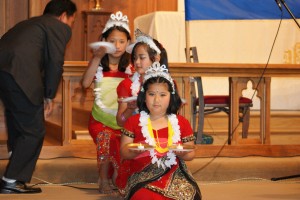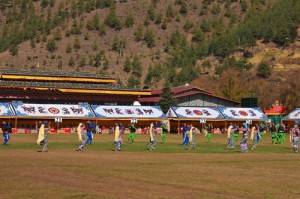Bhutanese–Americans and Preservation of Culture
The resettled Bhutanese of America have been undergoing different experiences and mixed views in a community with an assorted culture. The United States of America is a vast country with multicultural diversity. Yet unity irrespective to race, color, language or caste is the base of the strong nation. Patriotism is the distinguished attribute of Americans. They are also courteous, sincere and helpful. Every resettled Bhutanese are esteemed to find them in such a beautiful country. The people are really excited to start their lives anew and fresh. The Bhutanese are glad to adopt the inspiring habits of Americans. Without doubt everyone can explore themselves in this big community with lots of freedom but with caution. However, individual responsibilities and obligations should never be kicked off wherever one goes. Enjoying freedom after knowing its limits is wise. Little knowledge can be dangerous.
The life back in Bhutan was unimaginable- full of hardships and a lot of mental unrest. The policy adopted by the government of Bhutan to seclude the ethnic Nepalis was inestimable. Hence, the eviction of a good number of people became inevitable. What followed in the refugee camps could hardly be expressed in words. Nonetheless, this miserable situation never shattered the exiled Bhutanese. Because the people were very often dancing in their own cultural tunes, there was always a sense of oneness and unity. They were always united by the cultural awareness.
Incredible but true. The resettled folks have been so much engrossed in the western culture, norms and values that they have already begun to give up their Nepalipan. If not completely forgotten, the Nepali culture incorporated in the resettled people is in jeopardy. The people are in the threshold of loosing it. How can they forget their revolt against tyrannical Wangchuk dynasty to preserve their culture? The cultural spirit should always be raised up. Time has come for everyone to either hold on the culture that has been protected so far or to adopt a new one.
I often ponder over something that never gets erased from my mind. Can we-the Bhutanese-Nepalis forget the ‘Ashirbaads’ of our elders? ‘Tika and Jamara’ of Dashain, the national festival, and ‘Deusi-Bhaili’ performed in dipawali are still buzzing in our ears. How wise is it to replace Gunduk-dheedo by sandwich and Pizzas?
Should not we take steps towards preserving and protecting our cultural and traditional values before they fade out? I have always felt the need of cultural identity. As a fact, the culture should be passed to the next generation to save our identity from getting extinct. When nobody was able to snatch our culture in the past, how shrewd it shall be to have it sold for nothing at the time when we have freedom of mind? Interestingly, we have already lost our middle name. Can we at least save our first and last name? Barack Obama, the president of United States of America is Barack Hussain Obama. He has started to use his middle name.
Although we need to act according to the preset situation, I feel the Nepali culture does not allow its follower to engage in kissing and hugging publicly. It is unfortunate that people are found imitating others without considering its pros and cons. A need of a strong Bhutanese community in America has been always felt. Has anyone realized what its base would be? We are not in bulk but are still in crystal form. So, let’s do something to save these crystals from being dissolved.
A need for Bhutanese-Nepalis to unite is indispensible at least for the preservation and promotion of our cultural values, which are the only platform of our identities. Everyone should try to adjust because ‘survival of fittest’ is a fact but adjustment does not mean giving off everything and acquiring completely new personality. It is better keeping aside nasty ideologies and hold on firmly on what helps us to preserve our identity. The importance of anything is valued when it is lost. Let’s not loose our spirit.


